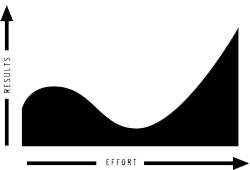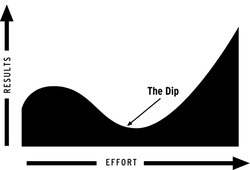
Ever reached a point of writing your book and think “This book sucks like there’s no tomorrow”?
Do you do that with a lot of your books?
Do you have a pile of uncompleted manuscripts, because they all stink up the room?
I’ve got some good news for you, and some bad news.
The Good News
The good news is that you are not a crappy writer–at least, not as sucky as you think you are. When you reach a point where you feel as Dorothy Parker once said:
This is not a novel to be tossed aside lightly. It should be thrown with great force.
…then you can take comfort in the knowledge that it’s not you, it’s just a phase of the writing process.
The Bad News
The bad news is that the “this totally sucks” phase can completely derail you, if you don’t recognize it for what it is.
If you’ve only completed one, two or even a few books, then you haven’t written enough novels to recognize that “this sucks” is a pattern that occurs about the same place in every novel you write.
If you’ve started many books and never finished them, it is very likely that you’ve been derailed by the “this sucks” stage, every time you hit it, and never realized it was a pattern.
I’ve only come to recognize that “this novel sucks” is a part of the writing process because I’ve written and completed so many novels (98 so far) and a great many short stories and novelettes.
What it is.
The “this sucks” blues tend to kick in around the one-third point in the novel, or–if you like the three act structure–about 25% of the way through the second act (or the 50% point of the second act, if you prefer four acts). The sensation/belief/unsettled feeling can last up to or just beyond the mid-point of the book.
It’s characterized by a strong need to avoid writing. Whenever you think of the story, your subconscious feels a sense of helplessness and dismay. Sometimes these feelings don’t even swim to the surface. They just make writing the book harder, at this stage.
Both plotters and pantsers can get hit by the syndrome. No one is immune.
Also, the degree of despair you feel over the novel will be different for every story. Some books will sail almost perfectly through the choppy stage, with barely a flap of the canvas (although it will be there, very faintly), while others bog you down with sleepless nights of questioning why you’re even bothering to write at all.
The book I’m currently writing was in the latter category. For the first time in a very, very large number of books, I actually asked myself if I should scrap the whole book and start again. Not that it is really a practical option for me, as it’s book 5 of a series and has to be written. But even asking myself if I should toss it alerted me to the depth of the “this sucks” phase this particular book dumped me into.
Which made me wonder why it happens like clockwork, to one degree or another, for every single book.
Why it happens
In my mind, I was able to draw a graph line that represented how happy I felt about the progress of any book, from beginning to end. On average, it would look something like this:

If you recognize the graph, then it’s likely you are familiar with Seth Godin’s The Dip. I recognized the curve of the line with a jolt, too. In Godin’s book the graph is:

Any sufficiently complex project–which includes the writing of a novel–reaches a point where the perceived or actual results aren’t reflected by the degree of effort you’re putting in. That’s called “The Dip” by Seth Godin: A point where motivation fizzles and projects get abandoned.
Sound familiar?
The dip, when you’re writing a novel, starts shortly before the mid-point, and as you can see by the curve, trends upwards once you’re past the mid-point.
Most projects have tangible, real-world results to provide feedback, while the only “results” you get when writing a novel are all in your head. It’s how you feel about the progress of the novel and it’s purely subjective. The only objective measure is your word or page count, which doesn’t provide feedback on the quality of your story-telling.
That puts novel-writing in a slightly different category to the average project, and changes the criteria for the quit/stay decision–which I’ll get to in a moment.
So why do you always have this sinking sensation at this point in the novel writing process?
When you start a novel, regardless of whether you’re writing in to the dark, or have an eighty page outline, you begin the novel in a highly optimistic state. You’re full of hope because potentially, the novel is going to be fantastic.
If you have an outline, you know exactly where the novel is going to go, and you’re excited by that.
If you’re pantsing, you still have a sense of excitement about the shape and feel of the story you want to tell.
By the time you reach the start of the dip, though, several things have happened:
- The initial glow has worn off.
- You’re buried in the weeds and lost sight of the overall shape and feel of the novel.
- You’ve spent more than 25% of the book setting up character arcs and plotlines and now you have a spaghetti mess with no resolutions in sight.
Even in the most perfectly structured book, nothing starts to be resolved until after the mid-point of the novel. So at the start of the dip, you have arcs and plotlines running everywhere and it feels very uncomfortable. If you’re a control freak (and a startlingly large number of indie fiction writers are–that’s why we’re indie publishing), then the loss of control adds to your anxiety.
This applies doubly to plotters, like me, because by this stage, characters have come to life, and in the process of actually writing the story, you’ve added details and made decisions that have shifted the plot a little, or a lot. What you plotted for the final act(s) no longer lines up…or may even be completely redundant now. That can be scary.
If you’re a pantser, you don’t have a final act concept in mind, because you’re still discovering that with your first draft. However, the mess you’ve set up and now have to juggle to find a coherent finale can make you think you can’t finish the book because it…sucks.
Should you quit?
This is actually a trick question for authors.
In Seth Godin’s book, he says, “The decision to quit or not is a simple evaluation: Is the pain of the Dip worth the benefit of the light at the end of the tunnel?”
He also suggests that quitting is not a good short-term strategy…and that is key.
If you’re struck by “I should toss this book” thoughts when you hit the dip, you need to recognize them for what they are: a temporary phase in the writing process.
Remember that until the book is finished and you gain feedback in whatever shape you prefer (beta readers, your mom, reviewers, editors, or even the completely objective voting readers do with their wallets), how you feel about the quality of the story is purely subjective and most likely hugely inaccurate.
I am always surprised by the reception of my books among readers. Always. They tend to go a little crazy over books that I consider merely solid, workmanlike stories, while the books-of-my-heart and those I thought were better than usual barely blip the monitor.
Because the only evaluation available to you when you hit the dip is your unreliable sense of quality, the best thing you can do is double-down and finish the book. Then you can get feedback and make a toss/keep decision, if you really want to.
But I’m betting you won’t toss it.
At worst, you can shelve the book on your hard drive for a year or so, and come back to it later. By then you’ll have grown as an author, and be able to better judge where the book’s weaknesses lie and fix them.
I would argue that you should publish the book, no matter how you feel about it. Fix the things your feedback points to and get it out there. Then be prepared to be astonished by what the reader thinks.
How to get through the dip.
It’s part mind-trick and part bloody-mindedness.
- Keep writing. Now, more than ever, make yourself hit your daily word counts.
- Every time “this sucks” thoughts rise, recognize that they’re temporary and will go away. Let them pass through your mind and get back to writing. Just knowing that this is a pattern, part of the novel-writing process, will help enormously.
- Keep thinking about the book in down moments, even when you’re not writing. Accept the chaos that comes from not having every arc and plotline nailed down perfectly, and know that if you keep writing, they will sort themselves out, and the rollercoaster ride you get when writing the final act will pay for the agony now.
- If the anxiety is acute, journal your thoughts — explain why you think the book sucks, in detail. Get it all down. You may even resolve some of the arcs and plotlines while you’re doing it.
- Leave notes for yourself, on points and details, scenes, etc., that you should go back and tweak or fix, or even re-write, once you’ve done the first draft, in order to smooth out the bumps. This will let you relax back into the process of writing, because your subconscious knows you won’t forget to make the changes, later.
t.
